Comprehensive Guide to Garden Maintenance in Mitcham
Introduction to Garden Maintenance
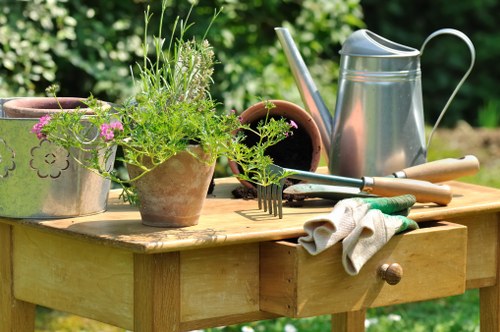
Maintaining a beautiful garden in Mitcham requires a blend of knowledge, dedication, and the right techniques. Whether you're a seasoned gardener or a novice, understanding the specific needs of your garden can transform your outdoor space into a lush, vibrant oasis.
Garden maintenance encompasses a variety of tasks, from regular watering and pruning to pest control and soil health management. Each of these elements plays a crucial role in ensuring your garden thrives throughout the year.
In the following sections, we'll explore essential garden maintenance tips tailored specifically for the Mitcham climate and soil conditions. By implementing these strategies, you can achieve a garden that not only looks stunning but also supports local biodiversity.
Understanding Mitcham's Climate
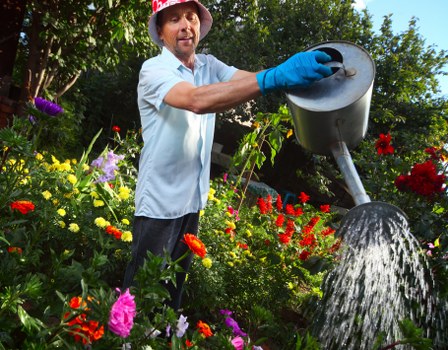
Mitcham enjoys a temperate climate, characterized by mild winters and warm summers. This climate is ideal for a wide range of plants, but it also presents unique challenges that gardeners must address.
One of the main considerations is the rainfall pattern. Mitcham receives moderate rainfall throughout the year, which means effective drainage is essential to prevent waterlogging and root diseases.
Additionally, the region experiences occasional heatwaves during the summer months. Implementing shade strategies and choosing heat-tolerant plant varieties can help your garden withstand these periods of intense sunlight.
Soil Preparation and Health
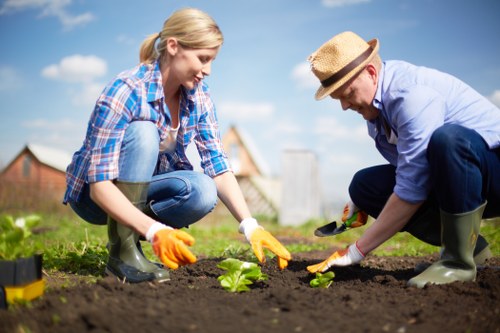
Healthy soil is the foundation of a thriving garden. In Mitcham, the soil tends to be a mix of clay and loam, which retains moisture well but can become compacted over time.
To improve soil structure, incorporate organic matter such as compost or well-rotted manure. This not only enhances soil fertility but also promotes better drainage and aeration.
Regular soil testing is recommended to monitor nutrient levels and pH balance. Adjusting the soil pH to suit specific plant requirements can significantly boost plant health and growth.
Plant Selection and Placement
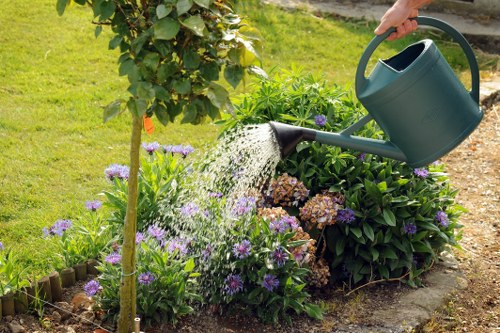
Choosing the right plants for your garden is crucial for successful maintenance. Consider native species that are adapted to Mitcham's climate, as they typically require less water and are more resistant to local pests.
When placing plants, take into account their light and space requirements. Proper spacing ensures good air circulation, reducing the risk of fungal diseases and promoting robust growth.
Incorporate a mix of perennials and annuals to maintain continuous blooms and greenery throughout the seasons. Additionally, integrating shrubs and trees can provide structure and serve as windbreaks, enhancing the overall garden design.
Watering Techniques
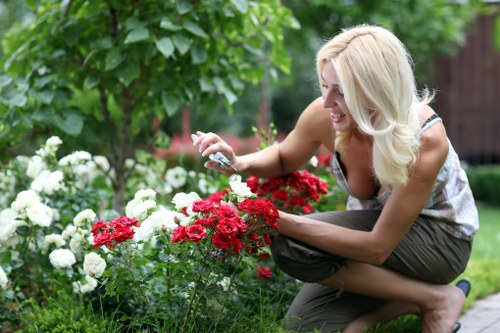
Efficient watering is a key aspect of garden maintenance. In Mitcham, the combination of rainfall and temperature fluctuations necessitates a balanced approach to irrigation.
Implement drip irrigation systems to deliver precise amounts of water directly to plant roots, minimizing wastage and reducing the risk of plant diseases associated with excess moisture.
Schedule watering during the early morning or late evening to reduce evaporation losses and ensure that plants receive adequate hydration. Monitoring soil moisture levels can help determine the optimal watering frequency for your garden.
Pruning and Trimming
Regular pruning and trimming are essential for maintaining plant health and aesthetics. Removing dead or diseased branches prevents the spread of pests and encourages new growth.
When pruning, use sharp and clean tools to make precise cuts, reducing the risk of damage to the plant. Proper techniques vary depending on the type of plant, so it's beneficial to familiarize yourself with specific pruning requirements.
In Mitcham's climate, late winter or early spring is an ideal time for pruning most deciduous plants, allowing them to recover and prepare for the growing season.
Pest and Disease Management
Keeping pests and diseases at bay is a significant part of garden maintenance. Integrated Pest Management (IPM) is an effective strategy that combines biological, cultural, and chemical methods to control pests sustainably.
Introduce beneficial insects, such as ladybugs and lacewings, which naturally prey on common garden pests. Regularly inspect plants for signs of damage or disease to address issues promptly.
Use organic treatments and avoid over-reliance on chemical pesticides, which can harm beneficial organisms and degrade soil health.
Lawn Care in Mitcham
A well-maintained lawn can enhance the overall appearance of your garden. In Mitcham, maintaining a healthy lawn involves regular mowing, aeration, and fertilization.
Mow your lawn to the recommended height for the grass species you have, ensuring it isn't cut too short, which can stress the grass and promote weed growth.
Aerate the lawn annually to alleviate soil compaction, allowing roots to access necessary nutrients and water effectively. Fertilize based on soil test results to supply essential nutrients without over-fertilizing.
Seasonal Maintenance Tasks
Each season brings different maintenance needs. Adapting your garden care routine to the changing weather ensures year-round garden health.
- Spring: Begin planting new perennials, prune shrubs, and prepare garden beds.
- Summer: Focus on watering, weeding, and protecting plants from heat stress.
- Autumn: Clean up fallen leaves, plant bulbs for next spring, and prepare plants for colder months.
- Winter: Perform soil testing, plan garden layouts, and protect sensitive plants from frost.
By staying proactive with seasonal tasks, you can prevent potential issues and maintain a vibrant garden throughout the year.
Mulching Techniques
Mulching is an effective practice for conserving soil moisture, suppressing weeds, and improving soil quality. Organic mulches, such as bark or straw, are excellent choices for gardens in Mitcham.
Apply a layer of mulch around plants, ensuring it's not piled against stems or trunks to prevent rot. Mulching also adds an aesthetic appeal, giving your garden a neat and finished look.
Regularly replenish mulch as it decomposes to maintain its benefits and support ongoing garden health.
Composting Basics
Composting is a sustainable way to recycle garden and kitchen waste into nutrient-rich soil amendment. In Mitcham, maintaining a compost pile can enhance your garden's soil health.
Balance green materials (such as vegetable scraps and grass clippings) with brown materials (like dried leaves and cardboard) to create an effective compost mix.
Turn the compost regularly to aerate it, speeding up the decomposition process and reducing odors. Finished compost can be used to enrich garden beds and improve soil structure.
Choosing the Right Tools
Having the appropriate gardening tools can make maintenance tasks more efficient and enjoyable. Invest in quality tools that are comfortable and suitable for the specific needs of your Mitcham garden.
Essential tools include a sturdy shovel, pruning shears, a hoe, a rake, and a reliable watering system. Regularly maintain your tools by cleaning and sharpening them to ensure longevity and effectiveness.
Consider ergonomic designs to reduce strain during prolonged gardening sessions, enhancing your overall gardening experience.
Eco-Friendly Gardening Practices
Embracing eco-friendly gardening practices not only benefits your garden but also the environment. Sustainable methods can reduce your garden's carbon footprint and promote biodiversity.
Utilize rainwater harvesting systems to collect and reuse water for irrigation, conserving this vital resource. Choose native plants to support local ecosystems and provide habitats for wildlife.
Reduce chemical usage by opting for organic fertilizers and natural pest control methods, fostering a healthy and balanced garden environment.
Hardscaping and Garden Structures
Incorporating hardscaping elements, such as pathways, patios, and fences, can enhance the functionality and aesthetics of your garden. Properly planned structures offer both beauty and practicality.
Choose materials that complement your garden style and are suitable for Mitcham's climate. Regular maintenance of these structures ensures their durability and appearance.
Integrate seating areas and pergolas to create inviting spaces for relaxation and outdoor activities, adding value to your garden.
Lighting for Gardens
Garden lighting extends the usability of your outdoor space into the evening and highlights key features. In Mitcham, selecting the right lighting can accentuate plant beauty and enhance safety.
Use a combination of ambient, task, and accent lighting to create a balanced and inviting atmosphere. Solar-powered lights are an eco-friendly option that minimizes energy consumption.
Strategically place lights along pathways and near seating areas to guide movement and create focal points within your garden.
Creating a Sustainable Garden
A sustainable garden is one that meets present needs without compromising future generations. Implementing sustainable practices ensures long-term garden health and environmental responsibility.
Focus on water conservation, soil health, and biodiversity to create a resilient garden ecosystem. Incorporate renewable resources and minimize waste to support sustainability goals.
Educate yourself about sustainable gardening techniques and stay updated with the latest practices to continually improve your garden's sustainability.
Common Garden Problems in Mitcham
Gardeners in Mitcham may encounter specific challenges, such as pest infestations, soil nutrient deficiencies, and weather-related issues. Identifying and addressing these problems promptly is essential for maintaining a healthy garden.
- Pest Infestations: Regular monitoring and early intervention can prevent minor pest issues from escalating.
- Soil Nutrient Deficiencies: Conduct soil tests and amend the soil as needed to ensure plants receive necessary nutrients.
- Weather-Related Challenges: Implement protective measures against extreme weather conditions, such as frost covers and shade nets.
By being proactive and informed, you can effectively manage these common garden problems and enjoy a flourishing garden in Mitcham.
Winterizing Your Garden
Preparing your garden for the winter months is crucial to protect plants and ensure a smooth transition into the next growing season. In Mitcham, winterizing involves several key steps.
Start by clearing away dead plant material and debris to reduce the risk of pest overwintering. Apply mulch to insulate plant roots and regulate soil temperature.
Protect sensitive plants with frost covers or by relocating them to sheltered areas. Additionally, store garden tools properly to prevent damage from moisture and freezing temperatures.
Spring Garden Preparation
As winter fades, it's time to prepare your garden for the new growing season. Spring preparation sets the foundation for a productive and beautiful garden in Mitcham.
Begin by cleaning garden beds and removing any leftover mulch or debris from winter. Test and amend the soil as necessary to ensure optimal conditions for planting.
Plan your garden layout, selecting plants that will thrive in the upcoming months. Early spring is also an ideal time for starting seeds indoors or sowing directly into the garden.
Summer Garden Care
Summer brings intense sunlight and higher temperatures, requiring specific care strategies to keep your garden healthy. In Mitcham, summer garden maintenance focuses on water management and heat protection.
Increase watering frequency, especially for new plantings, to prevent drought stress. Implement shading techniques, such as using shade cloths or planting taller plants to provide relief from the midday sun.
Regularly check for signs of plant stress or pest activity, addressing any issues promptly to maintain garden vibrancy.
Autumn Garden Maintenance
Autumn is a time for reflection and preparation in the gardening calendar. In Mitcham, autumn maintenance involves cleaning, planting, and preparing for the colder months ahead.
Remove annual plants and debris to prevent overwintering pests and diseases. Plant autumn perennials and bulbs that will establish roots before winter and bloom in the spring.
Prune trees and shrubs to encourage healthy growth and maintain garden structure. Additionally, rake and compost fallen leaves to enrich your soil.
Organic Gardening Practices
Organic gardening emphasizes natural processes and sustainability, avoiding synthetic chemicals and promoting ecological balance. In Mitcham, adopting organic practices can lead to a healthier and more resilient garden.
Use organic fertilizers, such as compost and green manures, to nourish your plants naturally. Employ natural pest control methods, including crop rotation and companion planting, to reduce pest populations.
Foster a diverse garden ecosystem by planting a variety of species, which attracts beneficial insects and supports overall garden health.
Herb and Vegetable Gardening
Incorporating herbs and vegetables into your garden adds functionality and joy to your outdoor space. Mitcham's climate is conducive to growing a wide range of edible plants.
Choose herbs that thrive in your local conditions, such as basil, rosemary, and thyme. Plant vegetables like tomatoes, lettuce, and carrots, ensuring they receive adequate sunlight and soil nutrients.
Implement companion planting techniques to enhance growth and deter pests naturally. Regular harvesting encourages continuous production and keeps plants healthy.
Perennial vs. Annual Plants
Understanding the difference between perennial and annual plants is vital for effective garden planning. Each type offers distinct benefits and maintenance requirements.
Perennials: These plants live for multiple years, providing long-term structure and beauty to your garden. They require less frequent replanting but may need periodic pruning and division.
Annuals: Annual plants complete their life cycle in one growing season, offering vibrant and continuous blooms. They need to be replanted each year but allow for seasonal variety and color.
Protecting Plants from Pests
Protecting your garden from pests is essential for maintaining plant health. In Mitcham, common garden pests include aphids, slugs, and snails.
Implement physical barriers, such as netting or copper tape, to deter pests from reaching your plants. Regularly inspect your garden for signs of infestation and remove pests manually when possible.
Encourage natural predators, like birds and beneficial insects, to keep pest populations in check. Using organic pesticides as a last resort can also help manage severe infestations without harming the ecosystem.
Maintaining Garden Paths and Walkways
Well-maintained paths and walkways enhance the accessibility and aesthetic appeal of your garden. In Mitcham, garden paths can be made from various materials, including gravel, stone, or wood.
Regularly clear paths of debris and weeds to keep them safe and attractive. Repair any damaged sections promptly to prevent tripping hazards and maintain a polished look.
Consider adding lighting to paths to improve safety during the evening hours and highlight your garden's features.
Incorporating Water Features
Water features, such as ponds, fountains, or birdbaths, can add tranquility and movement to your garden. In Mitcham, incorporating water elements enhances biodiversity and provides a habitat for wildlife.
Choose low-maintenance options that suit your garden size and your ability to care for them. Ensure proper placement to prevent excessive moisture near plant bases and structures.
Regular maintenance, including cleaning and monitoring water quality, is essential to keep water features functioning effectively and attract beneficial wildlife.
Decorative Plantings and Garden Art
Adding decorative plantings and garden art can personalize your garden and create visual interest. In Mitcham, select elements that complement your garden's style and existing structures.
Incorporate ornamental plants with unique foliage or colorful blooms to serve as focal points. Garden art, such as sculptures, planters, or decorative stones, can enhance the overall ambiance.
Balance decorative elements with natural features to maintain harmony and avoid overcrowding your garden space.
Gardening for Wildlife
Creating a wildlife-friendly garden supports local biodiversity and enriches your gardening experience. In Mitcham, fostering habitats for birds, insects, and other wildlife can make your garden more dynamic and sustainable.
- Birdhouses and Feeders: Attract birds by installing birdhouses and feeders, providing them with shelter and food sources.
- Pollinator-Friendly Plants: Plant species that attract bees, butterflies, and other pollinators to enhance plant reproduction and garden productivity.
- Water Sources: Provide clean water through birdbaths or small ponds to meet the needs of various wildlife species.
By designing your garden with wildlife in mind, you contribute to the ecological balance and enjoy the benefits of a vibrant, living garden.
Edible Landscaping
Edible landscaping combines aesthetic appeal with practical food production, making your garden both beautiful and bountiful. In Mitcham, integrating edible plants into your garden design offers multiple benefits.
Select decorative yet productive plants, such as fruit trees, berry bushes, and culinary herbs, to create a visually appealing and functional garden space.
Design pathways and planting beds to incorporate easy access for harvesting, ensuring that your edible plants receive adequate sunlight and care.
Vertical Gardening Solutions
Vertical gardening maximizes space and adds a unique dimension to your garden. In Mitcham, utilizing vertical structures can enhance plant growth and garden aesthetics, especially in smaller spaces.
Use trellises, wall-mounted planters, or vertical towers to grow climbing plants, herbs, or succulents. This approach promotes better air circulation and easier maintenance.
Vertical gardens also serve as natural barriers or decorative elements, contributing to the overall design and functionality of your outdoor space.
Gardening Tools and Technology
Incorporating the right tools and technology can streamline garden maintenance, making tasks more efficient and less labor-intensive. In Mitcham, leveraging modern gardening innovations can enhance your gardening experience.
Invest in high-quality tools, such as ergonomic pruners, durable hoses, and reliable wheelbarrows, to improve your gardening efficiency.
Utilize gardening apps and smart irrigation systems to monitor plant health, schedule watering, and manage garden tasks effectively.
Budget-Friendly Garden Maintenance
Maintaining a beautiful garden doesn't have to break the bank. In Mitcham, there are numerous budget-friendly strategies to keep your garden thriving without excessive spending.
- DIY Composting: Create your own compost using kitchen scraps and garden waste to reduce costs on fertilizers.
- Plant Propagation: Propagate plants from cuttings or seeds to expand your garden without purchasing new plants.
- Repurposing Materials: Use recycled materials for garden structures, planters, and decorations to save money and promote sustainability.
By adopting these cost-effective methods, you can enjoy a lush garden while staying within your budget.
Hiring Professional Garden Maintenance Services
While DIY garden maintenance is rewarding, hiring professional services can save time and ensure your garden receives expert care. In Mitcham, numerous garden maintenance professionals offer comprehensive services tailored to your needs.
Professionals can provide specialized services such as landscape design, soil testing, and pest management, enhancing the overall health and appearance of your garden.
Consider scheduling regular maintenance visits or one-time services to address specific challenges, ensuring your garden remains in optimal condition throughout the year.
Conclusion
Effective garden maintenance in Mitcham involves a combination of understanding the local climate, soil health, plant selection, and sustainable practices. By implementing the strategies outlined in this guide, you can cultivate a beautiful, resilient garden that flourishes year-round.
Whether you're tending to a small urban garden or a sprawling backyard, consistent care and informed decisions will lead to a thriving outdoor space that you can enjoy and cherish.
Ready to transform your garden? Contact us today or book your service now to start your garden maintenance journey in Mitcham.